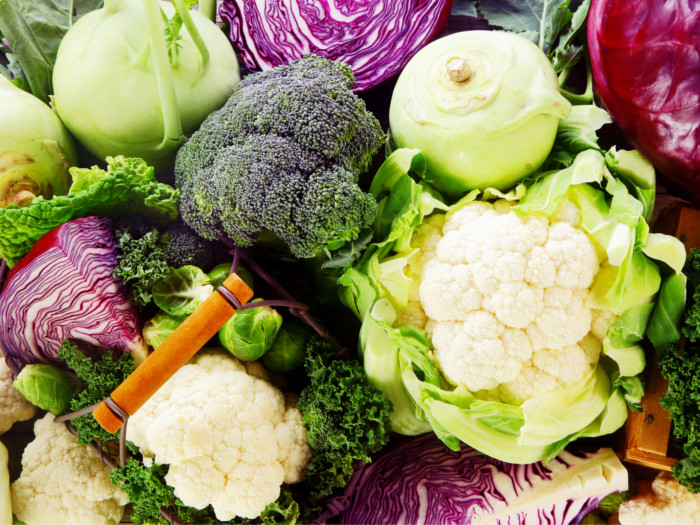Interestingly, many of the different cruciferous vegetables are classified under the same species name and are only differentiated by cultivars. That being said, each of these unique, yet relatively common vegetables, have different nutrient profiles and can contribute to different aspects of health. Let’s take a look at the best cruciferous vegetables list below.
Cruciferous Vegetables List
The top cruciferous vegetables include bok choy, rutabaga cabbage, collard greens, brussels sprouts, cauliflower, watercress, wasabi, turnips, and collard greens, among others.
Bok Choy
This leafy vegetable is known to increase your protein and fiber intake, helping to stimulate digestive processes, while also ensuring normal growth, development, and repair of the body. [1]
Rutabaga
Thanks to the high levels of beta-carotene and potassium in this vegetable, it has a reputation for mitigating symptoms of hypertension and improving vision health, along with reducing oxidative stress and chronic inflammation. [2]
Collard Greens
These unassuming greens are able to balance cholesterol levels and improve the health of the skin, thanks to its high levels of vitamin E. [3]

Eating cruciferous vegetables keep you fuller for a long time. Photo Credit: Shutterstock
Brussels Sprouts
Capable of boosting bone health and strengthening the immune system, brussels sprouts are rich in vitamin K and vitamin C, along with a number of other nutrients.
Cabbage
With a great amount of vitamin K, dietary fiber, potassium, choline, and phosphorous, cabbage is well known to protect the skin, hair, and eyes. [4]
Watercress
This cruciferous vegetable is extremely rich in antioxidants, such as lutein, zeaxanthin, and beta-carotene, making it a great natural way to prevent chronic diseases.
Cauliflower
This popular vegetable is able to boost digestion and aid in weight loss, thanks to its high levels of vitamin C and dietary fiber, coupled with a low level of calories. [5]
Swiss Chard
Considered one of the healthiest vegetables in this category, Swiss chard is rich in vitamin C, K, and A, as well as potassium, iron, and dietary fiber, helping to boost digestion and bone strength.
Mustard Greens
Packed with antioxidants and fiber, these leaves are able to detoxify the liver and lower cholesterol. This cruciferous vegetable can also improve your immune system’s response and prevent inflammation. [6]
Broccoli
This popular vegetable has an incredibly high level of vitamin K and vitamin C, as well as various B vitamins and other antioxidants. It can also aid in digestion, thanks to a large amount of dietary fiber.
Arugula
As an excellent source of magnesium, calcium, iron, potassium, and fiber, this unusual vegetable can aid in developing bone mineral density and lowering blood pressure. [7]
Turnips
These vegetables are a nutrient and vitamin powerhouse, while also providing decent amounts of protein and omega-3 fatty acids.
Kale
With no fat and very low-calorie levels, kale is one of the best additions you can make to your diet, particularly if you want to benefit from better digestion, lower cholesterol, better sleep habits, and stronger bones! [8]
